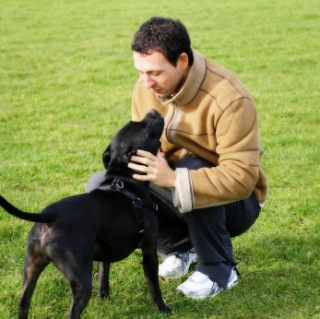Behavioral Health Prescriptions

Shannon McKay made an excellent point in her post about how asking for obedience is not unkind. The post got me thinking about how a dog's physical health is still taken more seriously than behavioral health by most people. They'll follow doctor’s orders to the letter when they've got a dog with a physical ailment. For example, Shannon's Great Dane will need several days of "bed" rest in order for her body to get back into condition. Few would question why she needs to lay low, or the importance of keeping her confined while her body heals. It's a necessary step in the process, and one that if heeded, will lead to her quality of life vastly improving in the long term.
Training is about conditioning your dog’s behavioral health. However, not many people understand the importance of following behavioral health prescriptions such as the many outlined on this site: hand-feeding new pups or dogs going through training. Another example, proper crate training/confinement is also an important component of house and manners training for most dogs, a necessary step in the process; one that, if heeded, will lead to a greater quality of life for dogs in the long term. But so many people balk at following the instructions of their trainer because crate training seems unkind. However, if done properly the puppy/new dog will have much clearer understanding of house rules and ultimately greater freedom to roam the house for life!
That is not to say owners shouldn't question their trainer if something doesn't make sense, or more importantly feels uncomfortable or bad to them intuitively because your dog’s behavioral prognosis also has to do with the way training is done.
Always be an advocate for your dog. Outline your goals in training that will lead to long term behavioral health and a working relationship/clear communication you and your dog, then do all you can to find a trainer who can bring out the best in both of you.
Of course training should be effective, get results. Yet training should also be fun and enhance the bond and mutual respect between dog and handler. Dogs are our partners, our companions, not little furry slaves or our adversaries trying to take over the world. Believe me when I say you can have both "obedience" or control over your dog and a fun, relaxed, companionable relationship as well. It's a beautiful thing and something we should all strive to achieve.
Periodically take the time to assess the dynamics between you and your dog. So where does your relationships stand with your dog? Is it balanced with equal amounts of love, silliness, affection and clear boundaries, rules, and expectations? Are you great friends with your dog but lacking control, even basic control that will provide your dog safety and a greater quality of life? Or, perhaps you've got the opposite problem and your dog behaves and performs very accurately but without and joy or enthusiasm. Does your dog happily come running to your side when you call, ears forward, tails swishing in a relaxed and happy manner? Have you followed your trainer's recommendations? If not, why not?




